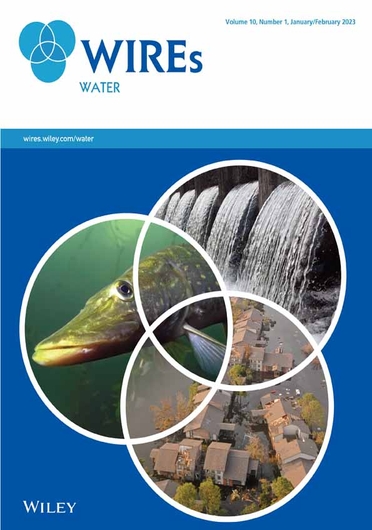全球北方的水不安全:对墨西哥边境美国殖民地社区经验的回顾
IF 5.8
1区 地球科学
Q1 ENVIRONMENTAL SCIENCES
引用次数: 14
摘要
自20世纪70年代末以来,“colonias”(英语)一词用于描述美国-墨西哥边境北部的低收入、城郊和农村地区。这些社区位于干旱和半干旱地区,现在处于特大干旱地区,基本基础设施有限,包括社区供水服务和卫生设施。最近的学术研究表明,殖民地居民如何经历不公正和不公平的动态,导致全球北方的水不安全。在这篇综述中,我们解释了为什么美国殖民地是理论化美国和全球北方以外的水不安全的一个重要例子。我们追溯了美国殖民地水基础设施发展的历史,展示了水资源不安全如何在法律上和社会上定义了殖民地。我们利用已发表的文献来讨论在美国殖民地产生水不安全的关键因素:政治排斥、市政约束和水质监测的失败。我们表明,在美国殖民地,水不安全导致了负面结果,包括水获取困难、身体健康风险和精神疾病。我们提出了四种可能的方法来改善美国殖民地的水安全:(1)供水的软路径和社会基础设施;(2)分散的水处理方法,如使用点、入口点和适合用途的系统;(3)非正式性,包括基础设施、经济和社会文化创新;(4)政治、政策和法律的创新和改革。与此同时,我们认真思考如何在合作和与美国殖民地居民自己的愿景保持一致的情况下,从道德上实现水安全。本文章由计算机程序翻译,如有差异,请以英文原文为准。
Water insecurity in the Global North: A review of experiences in U.S. colonias communities along the Mexico border
Since the late 1970s, the term “colonias” (in English) has described low‐income, peri‐urban, and rural subdivisions north of the U.S.‐Mexico border. These communities are in arid and semi‐arid regions—now in a megadrought—and tend to have limited basic infrastructure, including community water service and sanitation. Recent scholarship has demonstrated how colonias residents experience unjust and inequitable dynamics that produce water insecurity in the Global North. In this review, we explain why U.S. colonias are an important example for theorizing water insecurity in the United States and beyond in the Global North. Tracing the history of water infrastructure development in U.S. colonias, we show how colonias are legally and socially defined by water insecurity. We draw on the published literature to discuss key factors that produce water insecurity in U.S. colonias: political exclusion, municipal underbounding, and failures in water quality monitoring. We show that water insecurity had led to negative outcomes—including poor water access, risks to physical health, and mental ill‐health—in U.S. colonias. We present four possible approaches to improving water security in U.S. colonias: (1) soft paths & social infrastructure for water delivery, (2) decentralized water treatment approaches, such as point‐of‐use, point‐of‐entry, and fit‐for‐purpose systems; (3) informality, including infrastructural, economic, and socio‐cultural innovations; and (4) political, policy, and law innovations and reforms. At the same time, we reflect seriously on how water security can be ethically achieved in partnership and aligning with the visions of U.S. colonias residents themselves.
求助全文
通过发布文献求助,成功后即可免费获取论文全文。
去求助
来源期刊

Wiley Interdisciplinary Reviews: Water
Environmental Science-Ecology
CiteScore
16.60
自引率
3.70%
发文量
56
期刊介绍:
The WIREs series is truly unique, blending the best aspects of encyclopedic reference works and review journals into a dynamic online format. These remarkable resources foster a research culture that transcends disciplinary boundaries, all while upholding the utmost scientific and presentation excellence. However, they go beyond traditional publications and are, in essence, ever-evolving databases of the latest cutting-edge reviews.
 求助内容:
求助内容: 应助结果提醒方式:
应助结果提醒方式:


